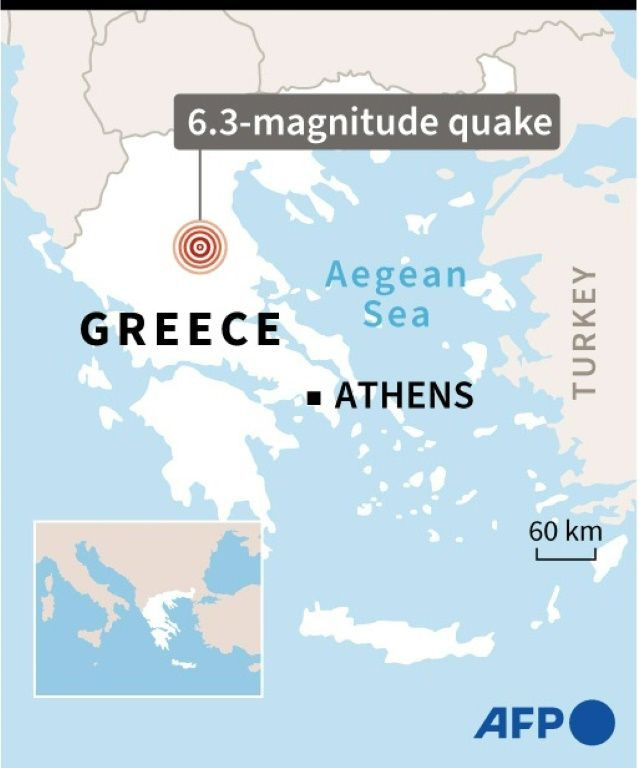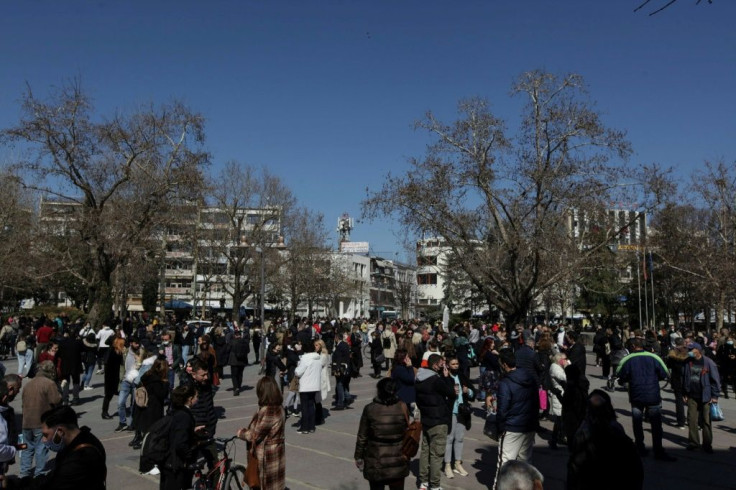Several Buildings Damaged As Strong Earthquake Hits Greece
A strong 6.3-magnitude earthquake hit central Greece on Wednesday, damaging several buildings and prompting crowds to rush into the streets, though no injuries or deaths were immediately reported.
Several aftershocks were reported after the main quake hit midday near the central city of Larissa, sparking panic in the area rarely hit by serious earthquakes.
"Everything happened very fast, people ran out of buildings, there are still aftershocks," Chrissoula Katsiouli, a staffer at the mayor's office in the local town of Elassona, near Larissa, told AFP.
"We are still dazed... it was very frightening," local resident Vassilis Boussias told Skai TV.
The civil protection authority said a disabled man had been rescued from his home in the village of Mesochori, after the side of the house completely collapsed.
The clock tower of a church in Damasi also caved in and a school was damaged.

"Fortunately, the teachers managed to get the children out very quickly and there were no victims," the mayor of Tyrnavos Yiannis Kokkouras told Skai TV, referring to the damaged school in Damasi.
There were no injuries reported after the earthquake, which struck at 12:16 am (1016 GMT), the civil protection authority said.
The agency also reported landslides had occurred in the region, and authorities were assessing further damage, while a helicopter was overflying the area in search for people in need.
Police also sealed off a bridge cracked by the quake, local media reported.
The US Geological Survey said the earthquake, which could be felt in central and northern Greece, was magnitude 6.3.
But the Institute of Geodynamics in Athens said earlier the quake had measured at a magnitude of 6.0.
Turkish Foreign Minister Mevlut Cavusoglu called his Greek counterpart Nikos Dendias to convey solidarity and said Ankara was ready to offer support if needed.

Relations between regional rivals Greece and Turkey markedly improved in 1999 when both countries were struck by deadly earthquakes less than a month apart.
Last year, the countries also cooperated on recovery efforts after a strong earthquake struck in the Aegean Sea, killing scores and causing vast damage mainly in Turkey.
According to the Athens observatory, the epicentre of the quake was 16 kilometres (10 miles) south of the town of Elassona and was eight kilometres deep.
There were several aftershocks following the main tremor -- including one at magnitude 5.7 -- after authorities issued a warning.
Seismologist Gerassimos Papadopoulos said there could be "significant aftershocks", speaking on Skai radio.
However, experts stress that quake faults in the area rarely produce tremors larger than the one clocked on Wednesday.
The last major earthquake in the area was in the 18th century and was magnitude 6.2, Manolis Skordilis, a seismologist at Thessaloniki's Aristotle University, told state agency ANA.
Greece is located on a number of fault lines, and is sporadically hit by earthquakes.
But the quakes often happen at sea and do not often kill people or cause extensive damage.
The last fatal earthquake was in October, when a magnitude 7.0 hit in the Aegean Sea between the Greek island of Samos and the city of Izmir in western Turkey.
The majority of damage was in Turkey where 114 people were killed and more than 1,000 injured.
In Greece, two teenagers were reported dead on the island of Samos.
© Copyright AFP 2024. All rights reserved.




















